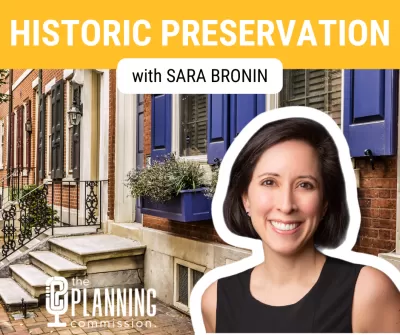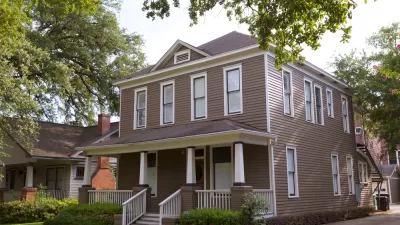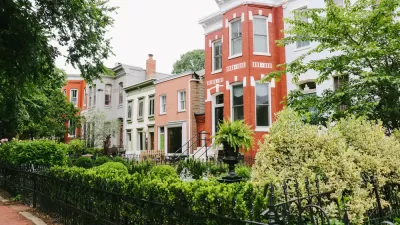Sara Bronin was recently appointed by President Biden to chair the ACHP. In this episode she takes us back to the future on what historic preservation means to American cities and what planners can do to balance preservation with contemporary needs.

We all love historic Main Streets and what they mean to a community. The desire to preserve the feel of such places is at the root of many local historic preservation efforts. The upper floors of those Main Street buildings are also part of that Main Street’s history, with many built as housing that has since been zoned out as a permitted use.
That’s where historic preservation, planning, and affordable housing can come together to address community needs while honoring our history, according to Advisory Council on Historic Preservation (ACHP) Chair Sara Bronin.
Bronin views preservation and community goals like housing affordability as endeavors that go hand-in-hand. “Preservation looks at the exterior of the building, while zoning looks primarily at the uses inside the building,” Bronin told The Planning Commission Podcast. “If we allow people to convert existing buildings into two-unit, three-unit, four-unit or multi-unit dwellings, that’s something that could help. If we’re locking the outside in stone, we don’t have to lock the inside in stone.”
Bronin discusses efforts beyond Main Street to help address housing needs, such as converting historic mill properties in Connecticut and elsewhere into housing and office space. “Those are often zoned for industrial developments only.”
As ACHP’s leader, Bronin addresses how the agency is adapting its definition of historic preservation. While the preservation movement in the United States was founded on desires to protect the properties of the Founding Fathers, it has evolved with the country to incorporate full neighborhoods, places of historical significance for women and diverse cultures. ACHP is now examining traditional cultural properties and how to adapt to climate change.
“One of the hot topics at fed level is how do we know something is significant?,” said Bronin. “Do we rely only on textbooks and people with doctoral degrees or do we actually rely on people with lived experience and knowledge about their communities.”
The Planning Commission is a spirited debate by planners, for planners. This independent outlet for all things planning explores the serious and lighter sides of the profession, poses probing and creative questions to guests, and always pairs the episode guest and topic with a choice libation. Listen to the podcast for a special offer from Planetizen.

Alabama: Trump Terminates Settlements for Black Communities Harmed By Raw Sewage
Trump deemed the landmark civil rights agreement “illegal DEI and environmental justice policy.”

Planetizen Federal Action Tracker
A weekly monitor of how Trump’s orders and actions are impacting planners and planning in America.

The 120 Year Old Tiny Home Villages That Sheltered San Francisco’s Earthquake Refugees
More than a century ago, San Francisco mobilized to house thousands of residents displaced by the 1906 earthquake. Could their strategy offer a model for the present?

In Both Crashes and Crime, Public Transportation is Far Safer than Driving
Contrary to popular assumptions, public transportation has far lower crash and crime rates than automobile travel. For safer communities, improve and encourage transit travel.

Report: Zoning Reforms Should Complement Nashville’s Ambitious Transit Plan
Without reform, restrictive zoning codes will limit the impact of the city’s planned transit expansion and could exclude some of the residents who depend on transit the most.

Judge Orders Release of Frozen IRA, IIJA Funding
The decision is a victory for environmental groups who charged that freezing funds for critical infrastructure and disaster response programs caused “real and irreparable harm” to communities.
Urban Design for Planners 1: Software Tools
This six-course series explores essential urban design concepts using open source software and equips planners with the tools they need to participate fully in the urban design process.
Planning for Universal Design
Learn the tools for implementing Universal Design in planning regulations.
Clanton & Associates, Inc.
Jessamine County Fiscal Court
Institute for Housing and Urban Development Studies (IHS)
City of Grandview
Harvard GSD Executive Education
Toledo-Lucas County Plan Commissions
Salt Lake City
NYU Wagner Graduate School of Public Service





























